Leadership Recommendation Letter
[Your Name]
[Your Title/Position]
[Your Organization]
[Your Address]
[City, State, Zip Code]
[Email Address]
[Phone Number]
[Today's Date]
[Recipient's Name]
[Recipient's Title/Position]
[Recipient's Organization]
[Recipient's Address]
[City, State, Zip Code]
Dear [Recipient's Name],
I am writing this letter to wholeheartedly recommend [Candidate's Name] for a leadership position within your esteemed organization. I have had the privilege of working closely with [Candidate's Name] for [duration] at [Your Organization], where they currently serve as [Candidate's Current Position].
During [Candidate's Name]'s tenure at our organization, I have witnessed remarkable qualities that distinguish them as a natural leader. They possess a unique blend of intelligence, diligence, and interpersonal skills that consistently place them at the forefront of any project or team. Whether it's spearheading complex initiatives, motivating colleagues, or navigating challenging situations, [Candidate's Name] exhibits exceptional leadership traits.
One of the most commendable aspects of [Candidate's Name]'s leadership style is their ability to inspire and cultivate a positive work environment. They prioritize team cohesion and encourage open communication, fostering a culture of collaboration and trust. Their genuine interest in the growth and development of their team members has led to increased productivity and employee satisfaction.
Moreover, [Candidate's Name] demonstrates exceptional problem-solving skills and a forward-thinking approach. They can effectively analyze situations, identify potential obstacles, and develop innovative strategies to overcome them. Their ability to adapt swiftly to changing circumstances has proven invaluable, particularly in dynamic and fast-paced environments.
Throughout their tenure, [Candidate's Name] has consistently achieved outstanding results, surpassing organizational targets and elevating team performance. Their natural charisma and unwavering dedication make them an asset to any team or project they are involved in.
I have no doubt that [Candidate's Name] will excel in any leadership role they undertake at [Recipient's Organization]. They have consistently displayed the qualities that organizations seek in their leaders, and I am confident they will make a substantial positive impact.
In conclusion, I wholeheartedly endorse [Candidate's Name] for a leadership position within your organization. If you require any further information or have any questions, please do not hesitate to reach out to me.
Thank you for considering [Candidate's Name] for this vital role. I have the utmost confidence in their abilities and potential for success.
Sincerely,
[Your Name]
Executive Leadership Position Recommendation
Subject: Strong Recommendation for [Candidate Name] for [Position Title]
Dear [Recipient Name/Hiring Committee],
I am writing to provide my highest recommendation for [Candidate Name] for the [Position Title] role at [Organization Name]. Having worked closely with [him/her/them] for [duration] in my capacity as [your position], I have witnessed firsthand [his/her/their] exceptional leadership capabilities and strategic vision.
[Candidate Name] consistently demonstrates the core qualities essential for executive leadership. [He/She/They] possesses an remarkable ability to inspire teams, navigate complex organizational challenges, and deliver measurable results. During [his/her/their] tenure as [previous position], [he/she/they] successfully [specific achievement with metrics], which resulted in [tangible outcome].
What distinguishes [Candidate Name] is [his/her/their] unique combination of strategic thinking and operational excellence. [He/She/They] has proven capable of setting ambitious yet achievable goals while fostering a culture of innovation and accountability. [His/Her/Their] leadership style balances decisiveness with collaboration, and [he/she/they] consistently earns the respect and loyalty of colleagues at all organizational levels.
I am confident that [Candidate Name] will bring exceptional value to your organization and excel in this leadership role. Please feel free to contact me at [phone] or [email] if you would like to discuss [his/her/their] qualifications in greater detail.
Sincerely,
[Your Name]
[Your Title]
[Organization]
[Contact Information]
Academic Leadership Position Recommendation
Subject: Recommendation for [Candidate Name] – [Academic Leadership Position]
Dear Search Committee Members,
It is with great enthusiasm that I recommend Dr. [Candidate Name] for the position of [Dean/Department Chair/Director] at [Institution Name]. I have had the privilege of collaborating with Dr. [Last Name] for [duration] and can attest to [his/her/their] outstanding qualifications for academic leadership.
Dr. [Last Name] embodies the scholarly excellence and administrative acumen necessary for this role. [His/Her/Their] research in [field] has garnered national recognition, including [specific honors/publications]. Beyond scholarly achievements, [he/she/they] has demonstrated exceptional ability to build consensus, manage budgets effectively, and advance institutional priorities.
In [his/her/their] current role as [position], Dr. [Last Name] has successfully [specific accomplishment], increasing [metric] by [percentage] while maintaining faculty morale and student satisfaction. [He/She/They] approaches challenges with both intellectual rigor and emotional intelligence, making [him/her/them] equally effective in faculty meetings and strategic planning sessions.
Dr. [Last Name] possesses the vision, integrity, and interpersonal skills to lead your [department/college/institution] toward continued excellence. I offer my unqualified endorsement and am available to discuss [his/her/their] candidacy further.
Respectfully,
[Your Name]
[Your Title and Department]
[Institution]
[Contact Information]
Team Leader Promotion Recommendation
Subject: Recommendation for [Employee Name]'s Promotion to Team Leader
Dear [Manager Name/HR Director],
I am pleased to recommend [Employee Name] for promotion to the Team Leader position in [Department Name]. Over the past [duration], I have directly supervised [him/her/them] and observed [his/her/their] consistent growth into a natural leader within our team.
[Employee Name] has proven [himself/herself/themselves] as both a high-performing individual contributor and an informal mentor to colleagues. [He/She/They] regularly volunteers to train new team members, coordinate project workflows, and step into leadership gaps when needed. These actions demonstrate [his/her/their] readiness for formal leadership responsibilities.
What impresses me most is [his/her/their] ability to balance technical expertise with people skills. [Employee Name] maintains strong relationships across departments, resolves conflicts diplomatically, and consistently meets deadlines while supporting team morale. [His/Her/Their] initiative on [specific project] resulted in [outcome] and showcased [his/her/their] strategic thinking.
I believe [Employee Name] has earned this promotion and will thrive in a Team Leader capacity. [He/She/They] has my full support and confidence.
Best regards,
[Your Name]
[Your Title]
[Department]
Nonprofit Leadership Recommendation – Heartfelt
Subject: Passionate Recommendation for [Candidate Name]
Dear [Board of Directors/Selection Committee],
I write this letter with genuine excitement about the possibility of [Candidate Name] leading [Organization Name]. Having worked alongside [him/her/them] for [duration] at [Current Organization], I have seen the transformative impact [he/she/they] has on both people and communities.
[Candidate Name] doesn't just manage programs – [he/she/they] breathes life into missions. When [he/she/they] took on [specific initiative], it wasn't simply about meeting objectives; it was about changing lives. The [number] families we served through [his/her/their] leadership told us their stories with tears of gratitude, and that speaks louder than any metric I could share.
What makes [him/her/them] extraordinary is [his/her/their] authentic commitment to the cause. [He/She/They] arrives early, stays late, and treats every stakeholder – from donors to beneficiaries – with equal respect and attention. [His/Her/Their] ability to inspire volunteers, secure funding, and maintain program quality simultaneously is remarkable.
Your organization deserves a leader who will champion your mission with both competence and compassion. [Candidate Name] is that leader. I cannot recommend [him/her/them] highly enough.
With warmest regards,
[Your Name]
[Your Title]
[Contact Information]
Leadership Development Program Recommendation
Subject: Recommendation for [Candidate Name] – [Program Name]
Dear Program Selection Committee,
I enthusiastically recommend [Candidate Name] for acceptance into the [Program Name] Leadership Development Program. As [his/her/their] [supervisor/mentor] at [Organization], I have observed [his/her/their] tremendous leadership potential and commitment to professional growth.
[Candidate Name] demonstrates the core competencies your program seeks to develop. [He/She/They] shows initiative by [specific example], emotional intelligence through [example], and strategic thinking when [example]. What particularly impresses me is [his/her/their] self-awareness regarding areas for growth and active pursuit of learning opportunities.
This program aligns perfectly with [Candidate Name]'s career trajectory. [He/She/They] has expressed clear goals to [career objective] and has already taken steps such as [examples] to prepare for expanded leadership responsibilities. Our organization has identified [him/her/them] as a high-potential employee worthy of this investment.
[Candidate Name] will bring dedication, curiosity, and diverse perspectives to your cohort. [He/She/They] will not only benefit from the program but will enrich the experience for fellow participants. I strongly support [his/her/their] application.
Sincerely,
[Your Name]
[Your Title]
[Organization]
[Contact Information]
Volunteer Leadership Position Recommendation
Subject: Recommendation for [Candidate Name] – Volunteer Leadership Role
Dear [Organization Name] Selection Committee,
I am delighted to recommend [Candidate Name] for the [Board Member/Committee Chair/Volunteer Coordinator] position with your organization. I have known [him/her/them] for [duration] through [context] and have consistently been impressed by [his/her/their] dedication and leadership abilities.
Despite [his/her/their] busy professional schedule, [Candidate Name] commits significant time and energy to community service. [He/She/They] currently volunteers with [organizations] and has demonstrated the ability to mobilize resources, engage stakeholders, and achieve outcomes. [His/Her/Their] work on [specific project] exemplifies [his/her/their] organizational skills and passion for the mission.
[Candidate Name] brings valuable skills including [skill 1], [skill 2], and [skill 3], along with a genuine commitment to [cause/mission]. [He/She/They] communicates effectively, builds relationships easily, and approaches challenges with creativity and persistence.
Your organization will benefit greatly from [Candidate Name]'s involvement in this leadership capacity. I wholeheartedly endorse [his/her/their] candidacy.
Warm regards,
[Your Name]
[Your Relationship to Candidate]
[Contact Information]
Military/Government Leadership Recommendation – Formal
Subject: Official Leadership Recommendation for [Rank/Title] [Last Name]
To Whom It May Concern:
This letter serves as my formal recommendation for [Rank/Title] [Full Name] for the [Position/Program/Promotion] under consideration. In my capacity as [your rank/title], I have supervised [Rank/Title] [Last Name] for [duration] and can provide authoritative assessment of [his/her/their] leadership qualifications.
[Rank/Title] [Last Name] has consistently exceeded performance standards and demonstrated the leadership competencies required for this opportunity. [His/Her/Their] record includes [specific achievements with quantifiable results], which reflect exceptional organizational skills, sound judgment, and commitment to mission success.
Technical proficiency, integrity, and accountability define [Rank/Title] [Last Name]'s approach to leadership. [He/She/They] has successfully commanded/managed [unit/team/project], maintaining operational readiness while developing subordinate personnel. [His/Her/Their] performance evaluations consistently rank in the top [percentage] of peers.
Based on [his/her/their] demonstrated capabilities and potential for increased responsibility, I recommend [Rank/Title] [Last Name] without reservation. [He/She/They] possesses the requisite qualifications and character for this position.
Respectfully submitted,
[Your Rank/Title]
[Your Full Name]
[Unit/Department]
[Official Contact Information]
Emerging Leader Recommendation – Encouraging
Subject: Strong Support for [Candidate Name]'s Leadership Opportunity
Dear [Recipient Name],
I'm writing to recommend [Candidate Name] for [position/program], and I want to emphasize why I believe [he/she/they] represents exactly the kind of emerging leader who will exceed your expectations.
While [Candidate Name] may have [less experience/non-traditional background] compared to other candidates, [he/she/they] possesses qualities that cannot be taught: genuine curiosity, resilience, and an authentic desire to serve others. I've watched [him/her/them] grow from [starting point] to [current level] in just [timeframe], demonstrating remarkable learning agility.
[Candidate Name] approaches leadership development seriously. [He/She/They] actively seeks feedback, reflects on experiences, and applies lessons learned. When faced with [specific challenge], [he/she/they] responded by [action taken], showing maturity beyond [his/her/their] years. [His/Her/Their] teammates consistently describe [him/her/them] as [positive attributes].
I encourage you to look beyond conventional metrics and see [Candidate Name]'s potential. Given the right opportunity and support, [he/she/they] will develop into an outstanding leader. I'm confident investing in [him/her/them] will yield significant returns.
Best wishes,
[Your Name]
[Your Title]
[Contact Information]
What Are Leadership Recommendation Letters and Why They Matter
- A leadership recommendation letter is a formal document attesting to an individual's leadership capabilities, character, and suitability for positions requiring management, strategic thinking, and team guidance
- These letters carry substantial weight because they provide third-party validation of leadership qualities that cannot be measured through resumes or test scores alone
- Organizations use these letters to assess candidates' potential to inspire teams, make sound decisions under pressure, navigate organizational politics, and drive meaningful results
- Leadership recommendations serve as risk mitigation tools for hiring authorities, particularly for senior positions where poor leadership choices can have far-reaching consequences
- They provide context and narrative that brings achievements to life, explaining not just what a candidate accomplished but how they led others to success
- In competitive selection processes, strong leadership recommendations often become the differentiating factor between similarly qualified candidates
When Should You Request or Provide a Leadership Recommendation Letter
- During executive recruitment processes for C-suite positions, vice president roles, or director-level appointments
- When applying for academic leadership positions such as dean, department chair, provost, or university president
- For promotion considerations to management or supervisory positions within an organization
- When seeking admission to executive MBA programs, leadership development programs, or executive education courses
- During board of directors selection processes for corporate, nonprofit, or community organizations
- For military officer promotions, command positions, or specialized leadership assignments
- When applying for competitive fellowships or awards that emphasize leadership potential or demonstrated leadership impact
- During succession planning processes when internal candidates are being evaluated for advancement
- For volunteer leadership roles in nonprofit organizations, professional associations, or community groups
- When transitioning from individual contributor roles to people management positions
Who Should Write Leadership Recommendation Letters
- Direct supervisors or managers who have observed the candidate's leadership in action over extended periods
- Senior executives who have worked with the candidate on strategic initiatives or high-stakes projects
- Board members or trustees who can speak to governance capabilities and strategic thinking
- Academic advisors or faculty members for candidates in educational contexts
- Colleagues at peer or higher levels who have collaborated with the candidate on cross-functional teams
- Clients or external partners who have benefited from the candidate's leadership and can provide objective assessment
- Previous employers, particularly those who supervised the candidate during formative leadership experiences
- Mentors who have guided the candidate's leadership development and can speak to growth trajectory
- Military commanders or senior officers for candidates in defense or government sectors
- Community leaders or nonprofit directors who have witnessed the candidate's volunteer leadership contributions
Essential Elements and Structure of Leadership Recommendation Letters
- Opening statement: Clear declaration of recommendation with the candidate's name, the position they're seeking, and your relationship to them
- Context of relationship: Duration and nature of your professional connection, including your position and authority to assess leadership
- Specific leadership accomplishments: Concrete examples with measurable outcomes rather than vague praise
- Character assessment: Evaluation of integrity, judgment, decision-making ability, and ethical standards
- Leadership style description: How the candidate leads, motivates, and develops others
- Comparative assessment: Where possible, how the candidate ranks among peers or others you've supervised
- Challenge handling: Examples of how the candidate navigated difficult situations, setbacks, or conflicts
- Future potential: Your assessment of the candidate's capacity for growth and increased responsibility
- Unqualified endorsement: Clear statement of support without hedging or ambiguity (unless you have reservations)
- Contact information: Your availability for follow-up questions and direct communication details
- Formal closing: Professional signature with title, organization, and credentials that establish your credibility
Requirements and Prerequisites Before Writing
- Obtain explicit permission from the candidate before agreeing to write the recommendation
- Request comprehensive information from the candidate including their resume, the position description, and application deadline
- Understand the specific leadership competencies the position requires or the program emphasizes
- Review your own records, notes, or performance evaluations related to the candidate's work
- Confirm you have sufficient knowledge of the candidate's leadership abilities to write credibly and specifically
- Verify any organizational policies regarding recommendations, particularly in government, military, or regulated industries
- Ensure you can meet the deadline with adequate time for thoughtful composition and review
- Clarify the submission process: will you send directly, provide to the candidate, or upload through a portal
- Determine if there are length requirements, format specifications, or specific questions to address
- Assess whether you can write a genuinely strong recommendation; if not, it's better to decline gracefully
How to Write an Effective Leadership Recommendation Letter
- Begin by brainstorming specific instances where the candidate demonstrated leadership qualities
- Focus on the "CAR" method: Context (situation), Action (what they did), Result (measurable outcome)
- Use active, confident language that conveys genuine enthusiasm rather than obligatory praise
- Balance professional accomplishments with character insights and interpersonal qualities
- Include specific metrics, percentages, or comparative data when available to substantiate claims
- Address both strengths and how the candidate handles areas of growth, showing self-awareness and development
- Tailor the letter to the specific opportunity, emphasizing relevant leadership qualities for that particular role
- Avoid generic templates or recycled language that could apply to anyone
- Write in a professional yet personal tone that reflects your authentic assessment
- Proofread meticulously for grammar, spelling, and factual accuracy, as errors undermine credibility
- Have the letter ready several days before the deadline to allow for candidate review if appropriate
Common Mistakes to Avoid
- Writing vague generalities like "excellent leader" without supporting evidence or specific examples
- Including lukewarm praise or faint endorsements that signal hidden reservations to experienced readers
- Focusing exclusively on technical skills while neglecting leadership qualities, interpersonal abilities, or character
- Exaggerating accomplishments or claiming credit for team achievements as individual successes
- Using overly complex language or jargon that obscures your message rather than clarifying it
- Submitting the same generic letter for multiple opportunities without customization
- Missing deadlines or submitting incomplete letters that lack required elements
- Discussing protected characteristics (age, race, religion, marital status) that could create legal issues
- Failing to address obvious gaps or concerns that readers will notice in the candidate's profile
- Writing recommendations for candidates you don't know well enough to assess fairly
- Including irrelevant personal information that doesn't relate to leadership capabilities
- Comparing the candidate unfavorably to others or including any negative statements
- Forgetting to update dates, names, or specific details when adapting previous letters
Formatting and Presentation Guidelines
- Use professional business letter format with appropriate headers, dates, and addresses when sending printed letters
- For email submissions, use a clear subject line and professional email signature
- Limit length to one to two pages; rarely should leadership recommendations exceed 500-750 words
- Use readable fonts (Times New Roman, Arial, Calibri) in 11-12 point size with standard margins
- Structure content in 3-5 paragraphs rather than dense blocks of text
- Maintain formal or professional tone appropriate to the context; avoid casual language for executive positions
- For academic positions, use institutional letterhead when available to enhance credibility
- Include all contact information prominently so recipients can easily follow up
- Sign letters that will be printed and scanned; use electronic signatures for digital submissions
- Save files as PDFs when uploading to portals to preserve formatting
- Double-check all names, titles, and organizational names for accuracy before sending
- Consider using bullet points for key accomplishments if appropriate to the format
Follow-Up Actions After Sending
- Inform the candidate when you've submitted the recommendation so they can track their application materials
- Keep a copy of the letter for your records in case follow-up questions arise
- Be available for phone calls or additional questions from the selection committee if they request clarification
- If significant time passes without decision, you may check with the candidate on application status
- Should the candidate be selected, offer congratulations and remain available as a resource for their transition
- If the candidate is not selected, provide encouragement and offer to write recommendations for future opportunities
- Update your own records or files about the candidate's career progression for future reference requests
- Consider whether any feedback from the process could improve your future recommendation letters
- Maintain confidentiality about the recommendation process and selection decisions
- Generally, no formal confirmation of receipt is expected unless specifically requested by the recipient organization
Advantages and Disadvantages of Leadership Recommendation Letters
Advantages:
- Provides third-party validation that adds credibility to self-reported accomplishments
- Offers insights into leadership style, character, and interpersonal skills not evident in resumes
- Allows candidates to differentiate themselves through others' perspectives and endorsements
- Gives selection committees additional data points for evaluating cultural fit and leadership potential
- Creates accountability as recommenders stake their professional reputation on their assessment
- Provides context for achievements and explains circumstances that numbers alone cannot convey
Disadvantages:
- Time-consuming for both writers and candidates to coordinate and complete thoughtfully
- Potential for bias based on personal relationships rather than objective merit
- Quality varies significantly depending on the writer's skill and effort invested
- Can disadvantage candidates who lack access to influential recommenders or professional networks
- Sometimes become perfunctory exercises where all letters sound similar and overly positive
- May reflect the writer's abilities more than the candidate's actual leadership qualities
- Confidential letters prevent candidates from knowing what's being said about them
Comparing Leadership Recommendations with Other Assessment Methods
- Performance reviews focus on past accomplishments within current role, while leadership recommendations emphasize future potential and broader capabilities
- 360-degree feedback provides multi-perspective input from various levels, whereas recommendation letters typically come from senior voices only
- Skills assessments and tests measure specific competencies objectively, but miss the contextual judgment that recommendations provide
- Interviews allow direct interaction with candidates, while recommendations offer prepared, thoughtful reflection on leadership over time
- Portfolio or work samples demonstrate tangible output but may not reveal how the candidate led teams to produce those results
- Professional references typically confirm employment facts, while leadership recommendations make qualitative judgments and predictions
- Personal statements express the candidate's own perspective, whereas recommendations provide external validation
- Leadership recommendations complement rather than replace other methods, adding narrative depth to quantitative data and self-assessment
Expert Tips and Best Practices
- Request recommendations from recommenders who have supervised you in leadership capacities rather than those who simply like you
- Provide recommenders with a "brag sheet" highlighting specific projects, metrics, and achievements to refresh their memory
- Give recommenders at least 3-4 weeks notice before the deadline to allow adequate time for thoughtful composition
- As a writer, lead with your strongest example or most compelling endorsement to capture attention immediately
- Use specific names, projects, and numbers rather than abstract descriptions to make your letter memorable
- Address any potential concerns proactively (career gaps, job changes, unconventional background) with positive framing
- For highly competitive positions, secure recommendations from the most senior or prestigious people possible who still know you well
- Update recommenders on outcomes and express gratitude regardless of results
- As a candidate, consider whether diverse perspectives (operational, strategic, client-facing) would strengthen your application
- For writers, if you genuinely cannot provide a strong recommendation, decline gracefully and quickly so the candidate has time to find alternatives
- Keep a template of your own accomplishments and leadership examples updated for when you need to provide information to recommenders
To Whom Should Leadership Recommendation Letters Be Addressed
- Hiring managers or search committee chairs for executive recruitment processes
- Directors of admissions or program directors for educational leadership programs
- Human resources departments or talent management teams for internal promotions
- Board chairs or nominating committees for board of directors positions
- Selection panels for military promotions or specialized assignments
- Fellowship or award committees for competitive recognition programs
- "To Whom It May Concern" only as last resort when specific recipient is unknown
- Multiple recipients if the letter will be used for various applications with the candidate's permission
- Specific individuals named in the application instructions or position announcement
- Department heads or unit commanders in organizational or military contexts
- When in doubt, ask the candidate for precise addressing information from the application materials
How Many Leadership Recommendations Are Typically Required
- Executive positions usually request 3-5 references with 2-3 formal letters
- Academic leadership roles typically require 3-4 detailed letters
- Internal promotions often require 1-2 letters from current supervisors or senior leaders
- Leadership development programs generally request 2-3 recommendations
- Board positions may require 1-2 letters along with professional references
- Military promotions follow specific guidelines varying by service branch and rank
- Fellowship applications typically require 2-3 letters emphasizing leadership potential
- Volunteer leadership positions may require only 1 letter or informal references
- Some organizations allow submission of additional letters beyond the minimum if they add unique perspectives
- Quality matters far more than quantity; one exceptional letter outweighs multiple mediocre ones

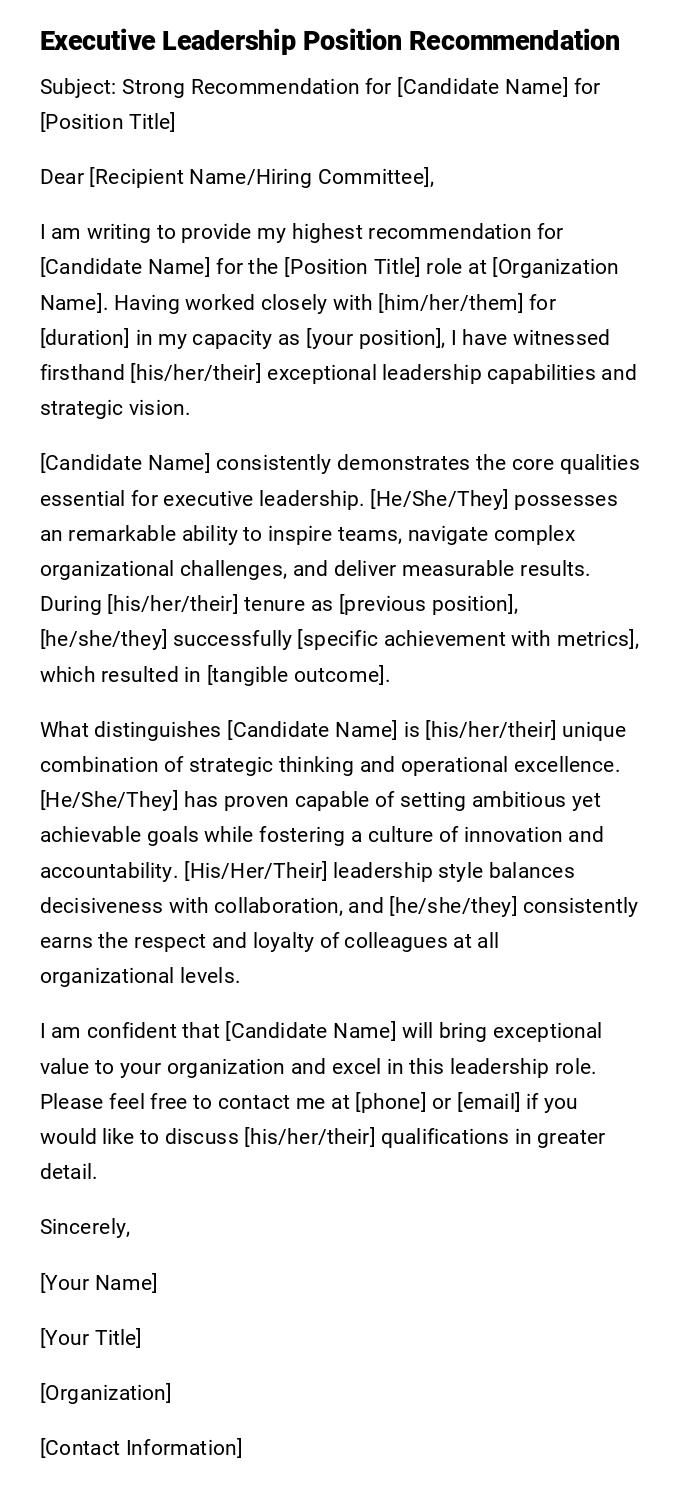
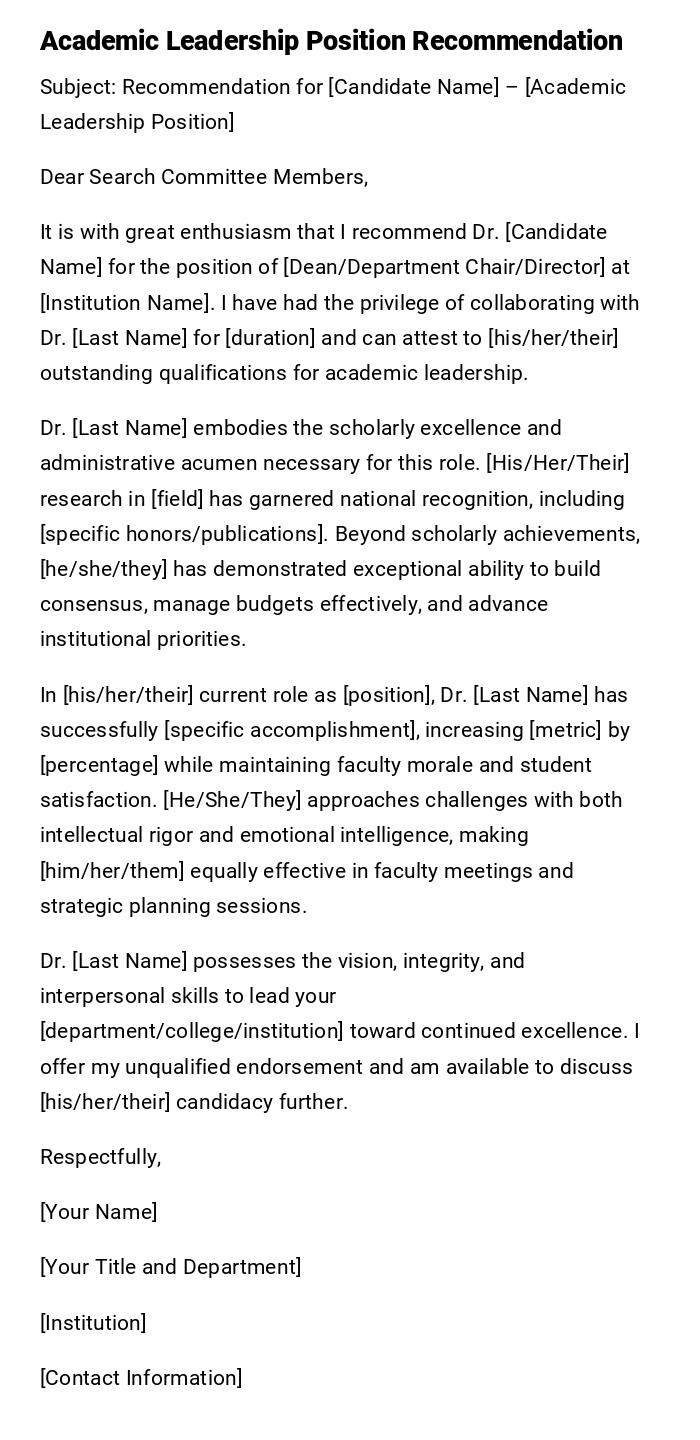
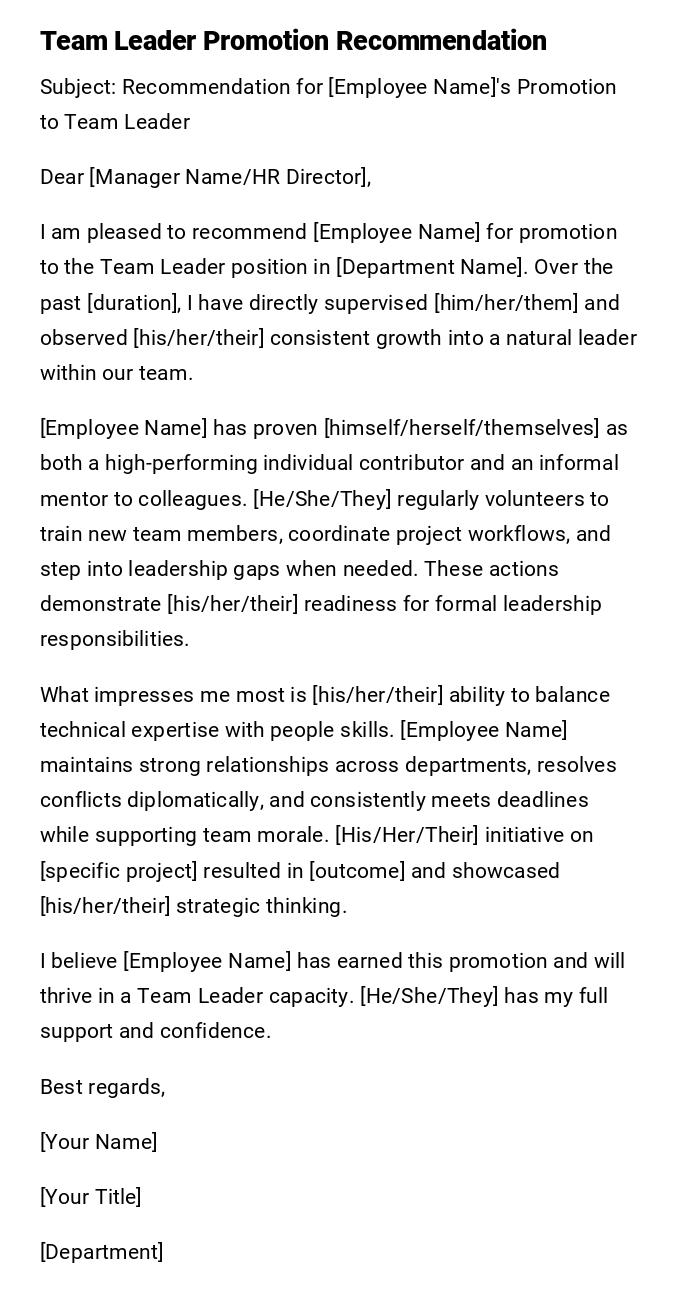
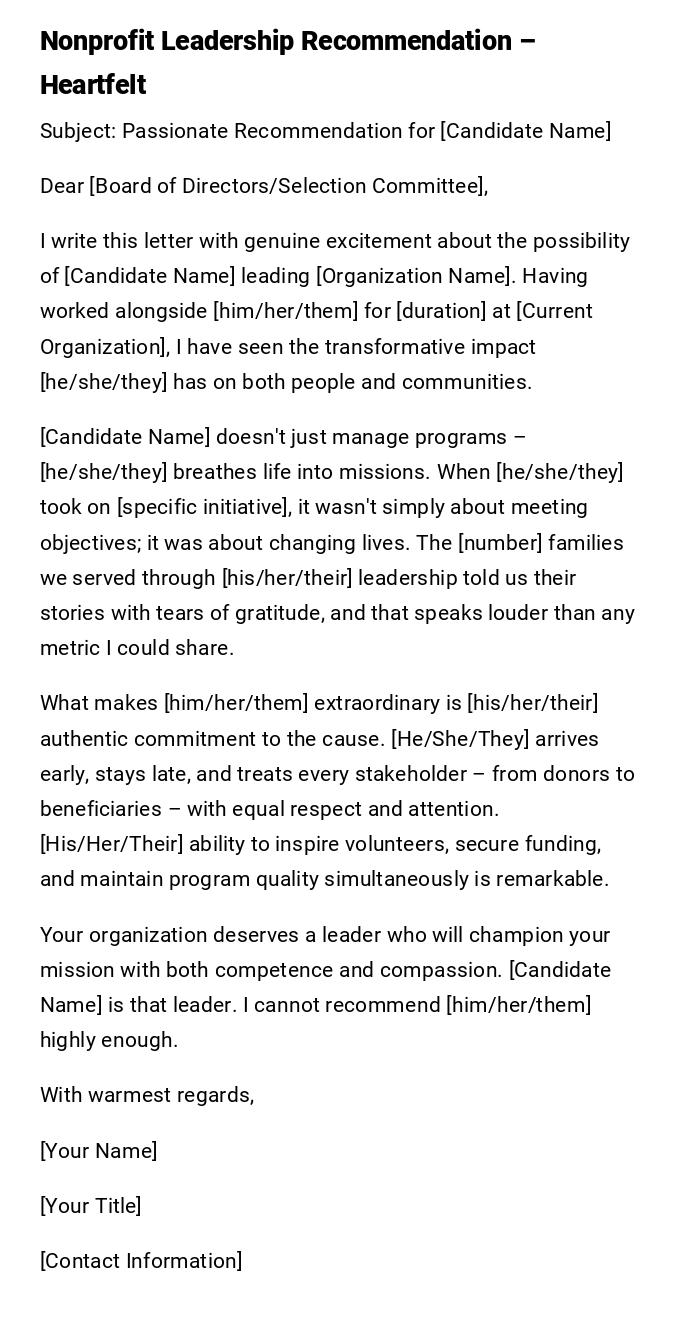
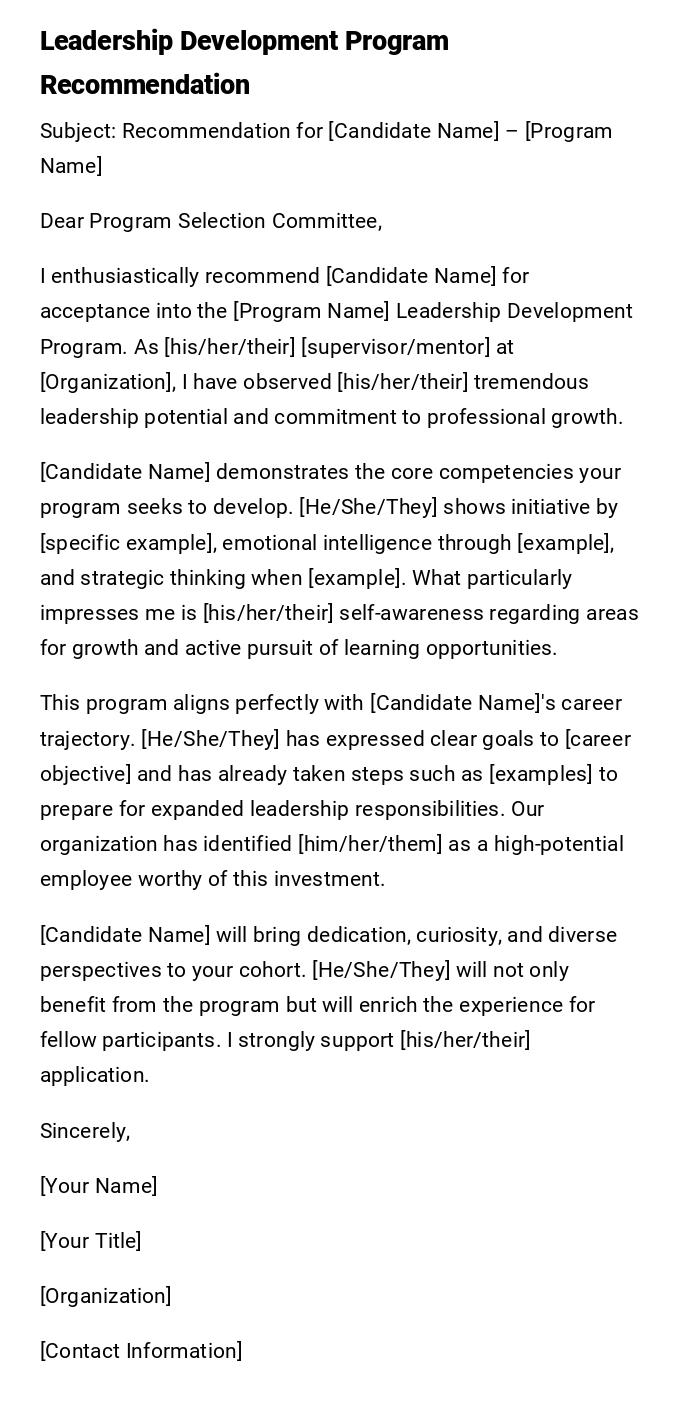
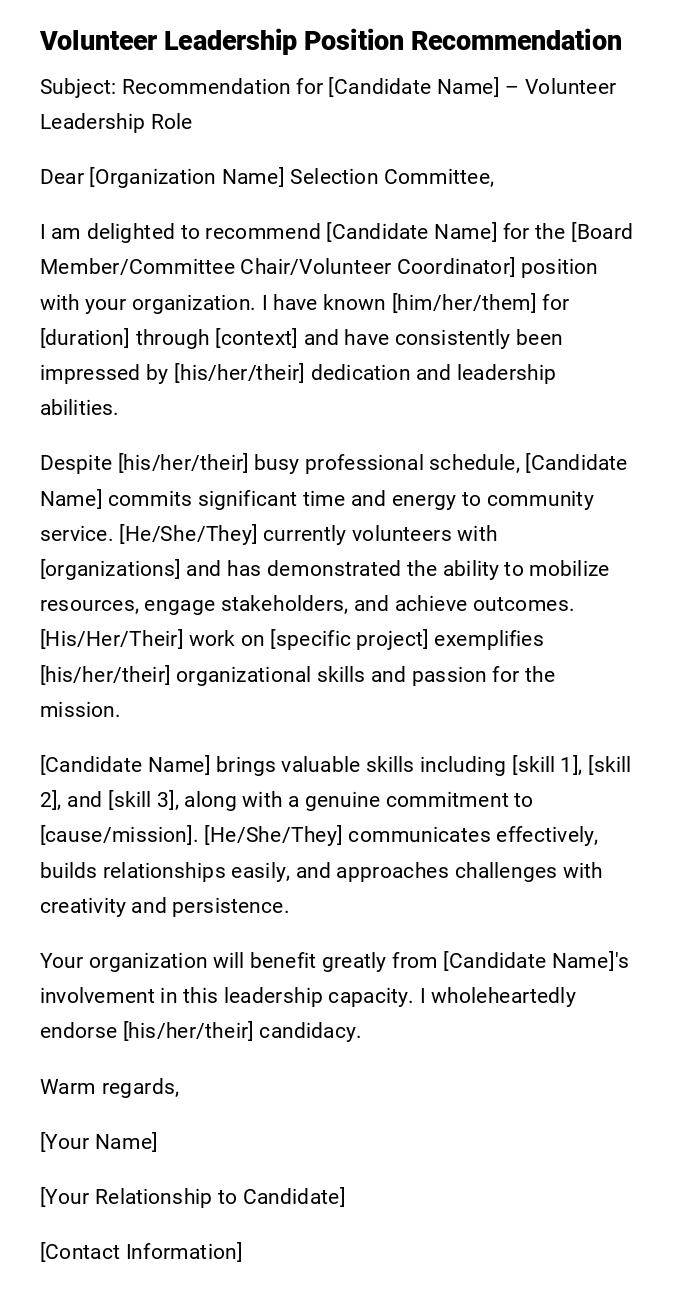
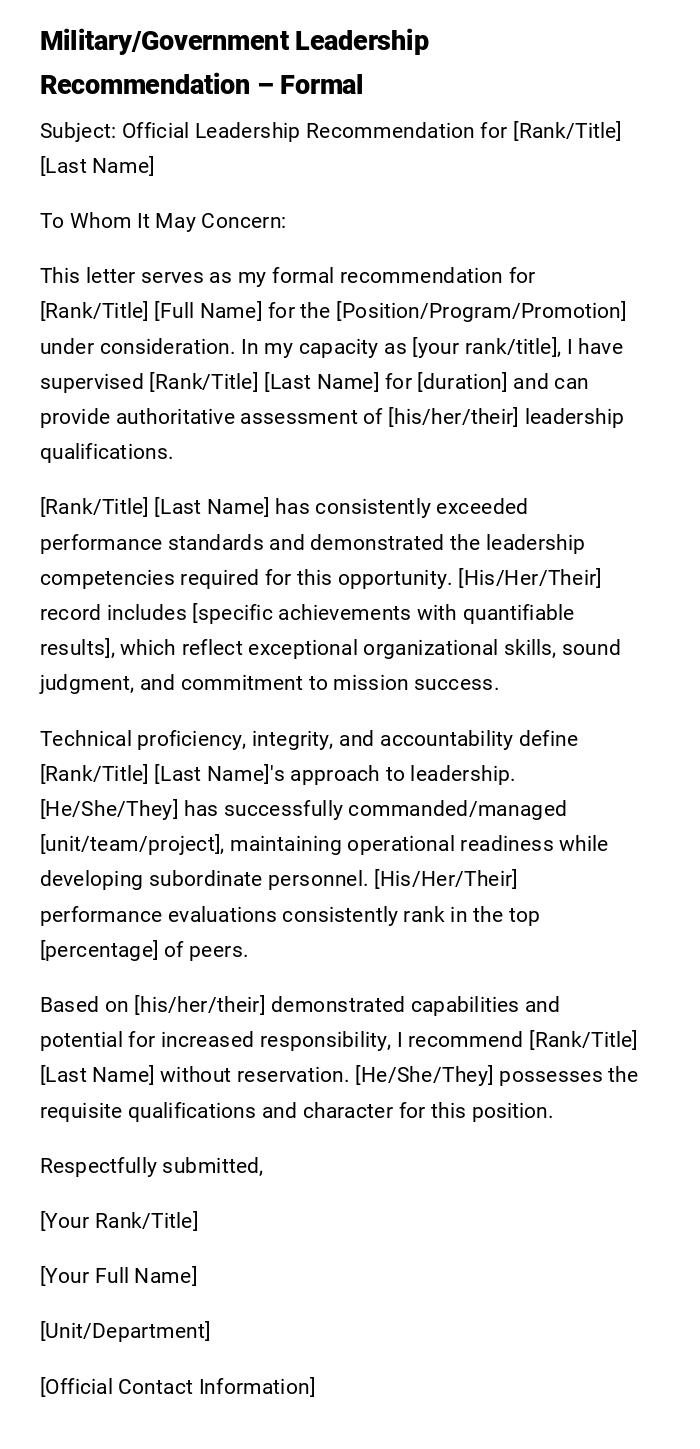
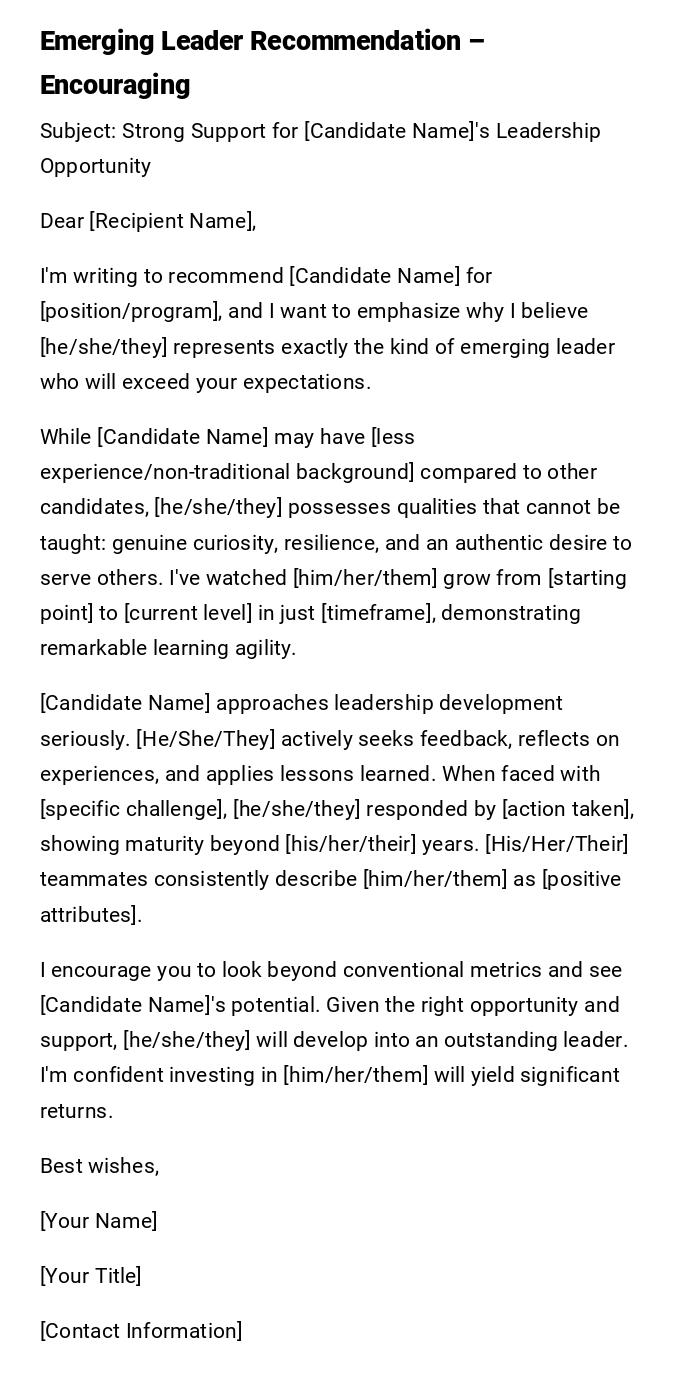

 Download Word Doc
Download Word Doc
 Download PDF
Download PDF